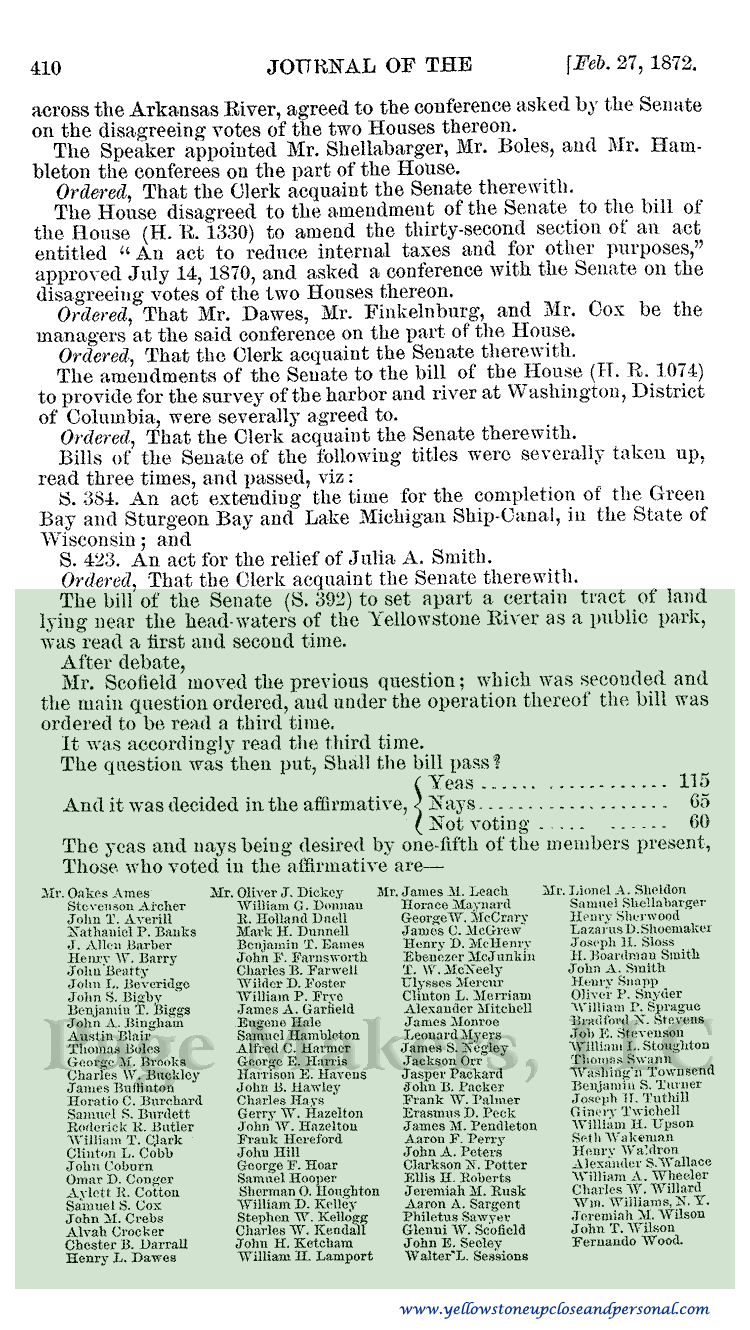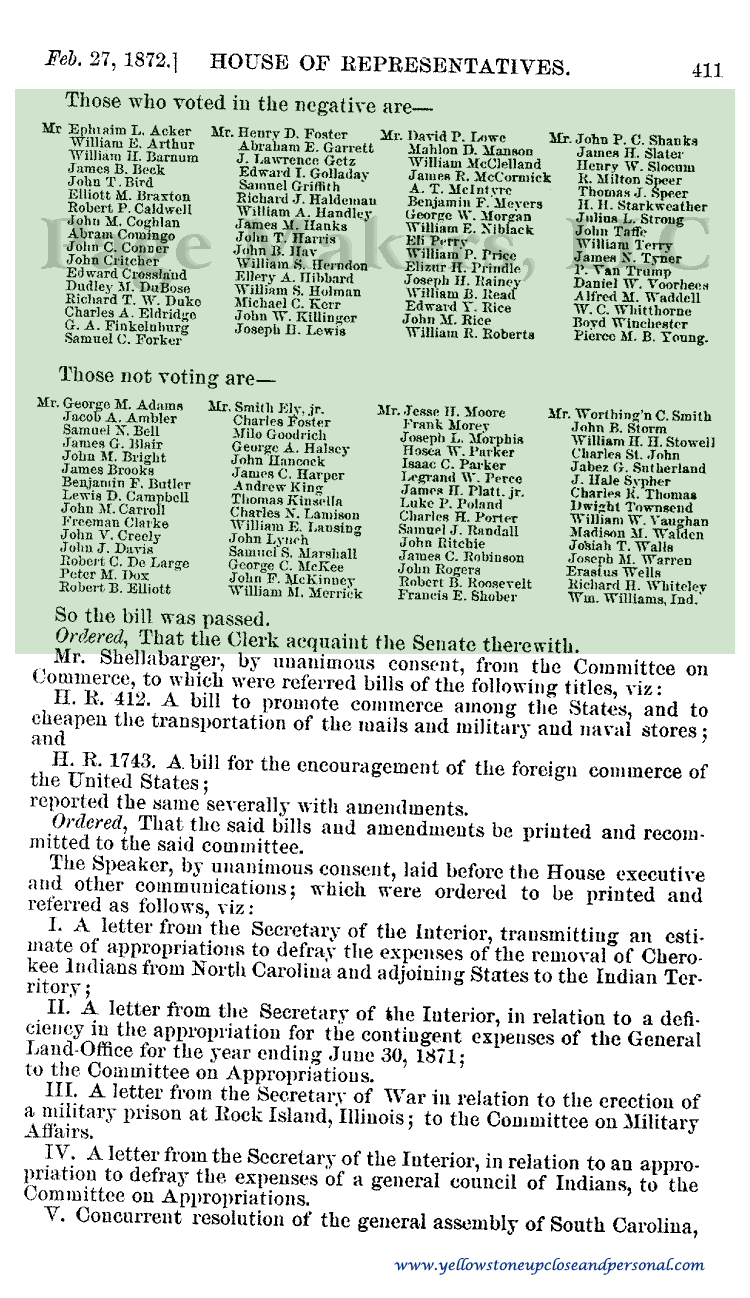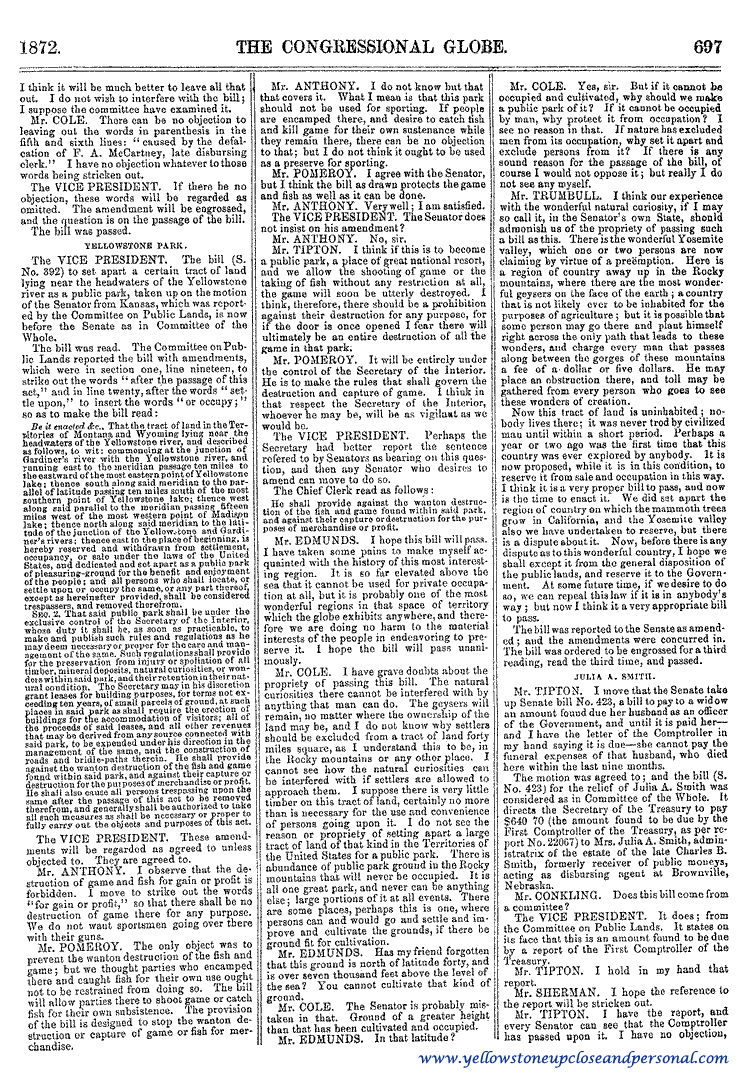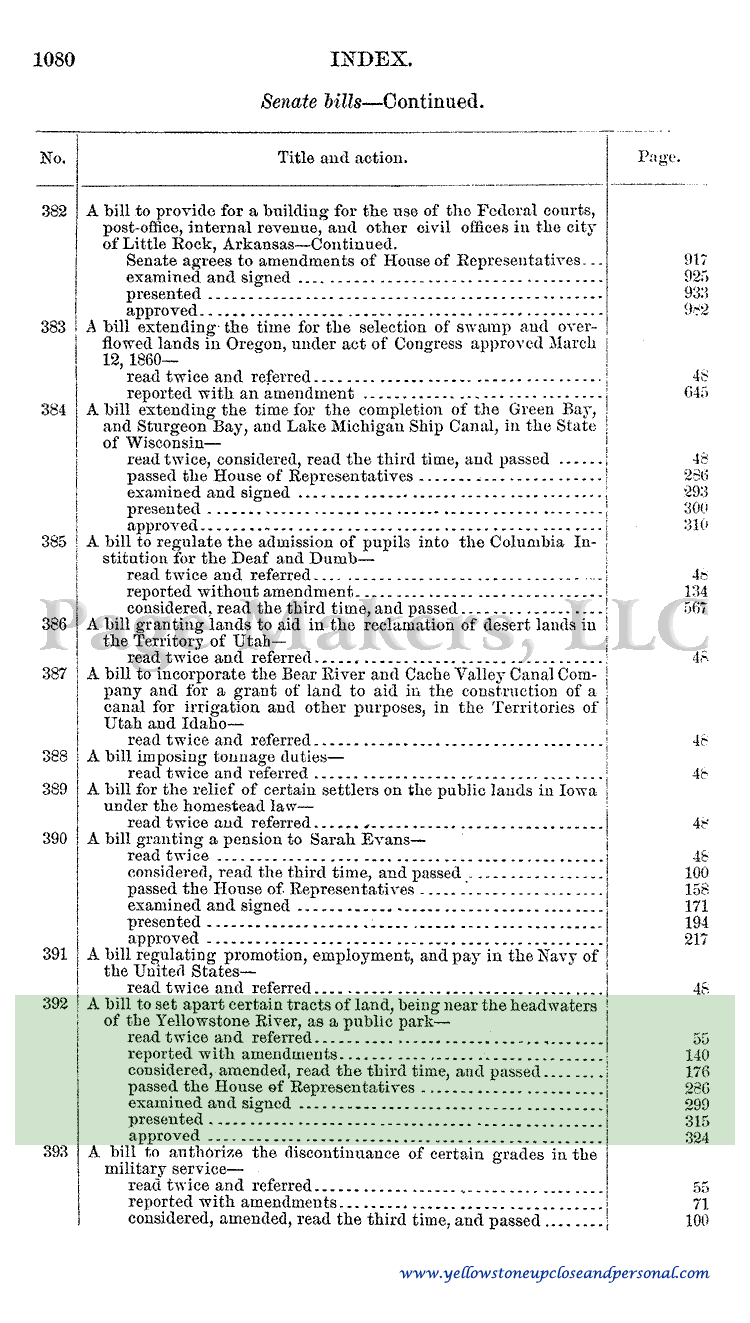

Yellowstone National Park Congressional History
| 410 THE JOURNAL OF THE HOUSE OF REPRESENTATIVES. [Feb. 27, 1872. | |||
|---|---|---|---|
| The bill of the Senate (S. 392) to set apart a certain tract of land lying near the head-waters of the Yellowstone River as a public park, was read a first and second time. After debate, Mr. Scofield moved the previous question; which was seconded and the main question ordered, and under the operation thereof the bill was ordered to be read a third time. The question was then put, Shall the bill pass? Yeas....................115 Nays.....................65 Not voting............60 And it was decided in the affirmative, The yeas and nays being desired by one-fifth of the members present, | |||
| Those who voted in the affirmative are-- | |||
| Mr. Oakes Ames Stevenson Archer John T. Averril Nathaniel P. Banks J. Allen Barber Henry W. Barry John Beatty John L. Beveridge John S. Bigby Benjamin T. Biggs John A. Bingham Austin Blair Thomas Boles George M. Brooks Charles W. Buckley James Buftinton Horatio C. Burchard Samuel S. Burdett Roderick R. Butler William T. Clark Clinton L. Cobb John Coburn Omar D. Conger Aylett R. Cotton Samuel S. Cox John M. Crebs Alvah Crocker Chester B. Darrall Henry L. Dawes |
Mr. Oliver J. Dickey William G. Donnan R. Holland Daell Mark H. Dunnell Benjamin T. Eames John F. Farnsworth Charles B. Farwell Wilder D. Foster William T. Frye James A. Garfield Eugene Hale Samuel Hambleton Alfred C. Harmer George E. Harris Harrison E. Havens John B. Hawley Charles Hays Gerry W. Hazelton John W. Hazelton Frank Hereford John Hill George F. Hoar Samuel Hooper Sherman O. Houghton William D. Kelley Stephen W. Kellogg Charles W. Kendall John H. Ketcham William H. Lamport |
Mr. James M. Leach Horace Maynard George W. McCrary James C. McGrew Henry D. McHenry Ebenezer McJunkin T. W. McNeely Ulysses Mercur Clinton L. Merriam Alexander Mitchell James Monroe Leonard Myers James S. Negley Jackson Orr Jasper Packard John B. Packer Frank W. Palmer Erasmus D. Peck James M. Pendleton Aaron F. Perry John A. Peters Clarkson N. Potter Ellis H. Roberts Jeremiah M. Rusk Aaron A. Sargent Philetus Sawyer Glenni W. Scofield John E. Seeley Walter L. Sessions |
Mr. Lionel A. Sheldon Samuel Shellabarger Henry Sherwood Lazarus D. Shoemaker Joseph H. Sloss H. Boardman Smith John A. Smith Henry Snapp Oliver P. Snyder William P. Sprague Bradford N. Stevens Job E. Stevenson William L. Stoughton Thomas Swann Washing'n Townsend Bejnamin S. Turner Joseph H. Tuthill Ginery Twichell William H. Upson Seth Wakeman Henry Waldron Alexander S. Wallace William A. Wheeler Charles W. Willard Wm. Williams, N. Y. Jeremiah M. Wilson John T. Wilson Fernando Wood. |
| Those who voted in the negative are-- | |||
| Mr. Ephriam L. Acker William E. Arthur William H. Barnum James B. Beck John T. Bird Elliott M. Braxton Robert P. Caldwell John M. Coghlan Abram Comingo John C. Conner John Critcher Edward Crossland Dudley M. DuBose Richard T. W. Duke Charles A. Eldridge G. A. Finkelnburg Samuel C. Forker |
Mr. Henry D. Foster Abraham E. Garrett J. Lawrence Getz Edward I. Golladay Samuel Griffith Richard J. Haldeman William A. Handley James M. Hanks John T. Harris John B. Hav William S. Herndon Ellery A. Hibbard William S. Holman Michael C. Kerr John W. Killinger Joseph H. Lewis |
Mr. David P. Lowe Mahlon D. Manson William McClelland Jamer R. McCormick A. T. McIntyre Benjamin F. Meyers George W. Morgan William E. Niblack Eli Perry William P. Price Elizur H. Prindle Joseph H. Rainey William B. Read Edward Y. Rice John M. Rice William R. Roberts |
Mr. John P. C. Shanks James H. Slater Henry W. Slocum R. Milton Speer Thomas J. Speer H. H. Starkweather Julius L. Strong John Taffe William Terry James N. Tyner P. Van Trump Daniel W. Voorhees Alfred M. Waddell W. C. Whitthorne Boyd Winchester Pierce M. B. Young |
| Those not voting are-- | |||
| Mr. George M. Adams Jacob A. Ambler Samuel N. Bell James G. Blair John M. Bright James Brooks Benjamin F. Butler Lewis D. Campbell John M. Carroll Freeman Clarke John V. Creely John J. Davis Robert C. De Large Peter M. Dox Robert B. Elliott |
Mr. Smith Ely, jr. Charles Foster Milo Goodrich George A. Halsey John Hancock James C. Harper Andrew King Thomas Kinsella Charles N. Lamison William E. Lansing John Lynch Samuel S. Marshall George C. McKee John F. McKinney William M. Merrick |
Mr. Jesse H. Moore Frank Morey Joseph L. Morphis Hosea W. Parker Isaac C. Parker Legrand W. Perce James H. Platt, jr. Luke P. Poland Charles H. Porter Samuel J. Randall John Ritchie James C. Robinson John Rogers Robert B. Roosevelt Francis E. Shober |
Mr. Worthing'n C. Smith John B. Storm William H. H. Stowell Charles St. John Jabez G. Sutherland J. Hale Sypher Charles R. Thomas Dwight Townsend William W. Vaughan Madison M. Walden Josiah T. Walls Joseph M. Warren Erastus Wells Richard H. Whiteley Wm. Williams, Ind |
| So the bill was passed. Ordered, That the Clerk acquaint the Senate therewith. |
|||


Images provided by the Library of Congress
| 1872. THE CONGRESSIONAL GLOBE. 697 | ||
|---|---|---|
The bill was read. The Committee on Public Lands reported the bill with amendments, which were in section one, line nineteen, to strike out the words "after the passage of this act," and in line twenty, after the words "settle upon," to insert the words "or occupy; " so as to make the bill read: Be it enacted &c., That the tract of land in the Territories of Montana and Wyoming lying near the headwaters of the Yellowstone river, and described as follows, to wit: commencing at the junction of Gardiner's river with the Yellowstone river, and running east to the meridian passage ten miles to the eastward of the most eastern point of Yellowstone lake; thence south along said meridian to the parallel of latitude passing ten miles south of the most southern point of Yellowstone lake; thence west along said parallel to the meridian passing fifteen miles west of the most western point of Madison lake; thence north along said meridian to the latitude of the junction of the Yellowstone and Gardiner’s rivers; thence east to the place of beginning, is hereby reserved and withdrawn from settlement, occupancy, or sale under the laws of the United States, and dedicated and set apart as a public park of pleasuring-ground for the benefit and enjoyment of the people; and all persons who shall locate, or settle upon or occupy the same, or any part thereof, except as hereinafter provided, shall be considered trespassers, and removed therefrom. Sec. 2. That said public park shall be under the exclusive control of the Secretary of the Interior, whose duty it shall be, as soon as practicable, to make and publish such rules and regulations as he may deem necessary or proper for the care and management of the same. Such regulations shall provide for the preservation from injury or spoliation of all timber, mineral deposits, natural curiosities, or wonders within said park, and their retention in their natural condition. The Secretary may in his discretion grant leases for building purposes, for terms not exceeding ten years, of small parcels of ground, at such places in said park as shall require the erection of buildings for the accommodation of visitors; all of the proceeds of said leases, and all other revenues that may be derived from any source connected with said park, to be expended under his direction in the management of the same, and the construction of roads and bridle-paths therein. He shall provide against the wanton destruction of the fish and game found within said park, and against their capture or destruction for the purposes of merchandise or profit. He shall also cause all persons trespassing upon the same after the passage of this act to be removed therefrom, and generally shall be authorized to take all such measures as shall be necessary or proper to fully carry out the objects and purposes of this act. The VICE PRESIDENT. These amendments will be regarded as agreed to unless objected to. They are agreed to. Mr. ANTHONY. I observe that the destruction of game and fish for gain or profit is forbidden. I move to strike out the |
words "for gain or profit," so that there shall be no destruction of game there for any purpose. We do not want sportsmen going over there with their guns. Mr. POMEROY. The only object was to prevent the wanton destruction of the fish and game; but we thought parties who encamped there and caught fish for their own use ought not to be restrained from doing so. The bill will allow parties there to shoot game or catch fish for their own subsistence. The provision of the bill is designed to stop the wanton destruction or capture of game or fish for merchandise. Mr. ANTHONY. I do not know but that that covers it. What I mean is that this park should not be used for sporting. If people are encamped there, and desire to catch fish and kill game for their own sustenance while they remain there, there can be no objection to that; but I do not think it ought to be used as a preserve for sporting. Mr. POMEROY. I agree with the Senator, but I think the bill as drawn protects the game and fish as well as it can be done. Mr. ANTHONY. Very well; I am satisfied. The VICE PRESIDENT. The Senator does not insist on his amendment? Mr. ANTHONY. No, sir. Mr. TIPTON. I think if this is to become a public park, a place of great national resort, and we allow the shooting of game or the taking of fish without any restriction at all, the game will soon be utterly destroyed. I think, therefore, there should be a prohibition against their destruction for any purpose, for if the door is once opened I fear there will ultimately be an entire destruction of all the game in that park. Mr. POMEROY. It will be entirely under the control of the Secretary of the Interior. He is to make the rules that shall govern the destruction and capture of game. I think in that respect the Secretary of the Interior, whoever he may be, will be as vigilant as we would be. The VICE PRESIDENT. Perhaps the Secretary had better report the sentence refered to by Senators as bearing on this question, and then any Senator who desires to amend can move to do so. The Chief Clerk read as follows: He shall provide against the wanton destruction of the fish and game found within said park, and against their capture or destruction for the purposes of merchandise or profit. Mr. EDMUNDS. I hope this bill will pass. I have taken some pains to make myself acquainted with the history of this most interesting region. It is so far elevated above the sea that it cannot be used for private occupation at all, but it is probably one of the most wonderful regions in that space of territory which the globe exhibits anywhere, and therefore we are doing no harm to the material interests of the people in endeavoring to preserve it. I hope the bill will pass unanimously. Mr. COLE. I have grave doubts about the propriety of passing this bill. The natural curiosities there cannot be interfered with by anything that man can do. The geysers will remain, no matter where the ownership of the land may be, and I do not know why settlers should be excluded from a tract of land forty miles square, as I understand this to be, in the Rocky mountains or any other place. |
I cannot see how the natural curiosities can be interfered with if settlers are allowed to approach them. I suppose there is very little timber on this tract of land, certainly no more than is necessary for the use and convenience of persons going upon it. I do not see the reason or propriety of setting apart a large tract of land of that kind in the Territories of the United States for a public park. There is abundance of public park ground in the Rocky mountains that will never be occupied. It is all one great park, and never can be anything else; large portions of it at all events. There are some places, perhaps this is one, where persons can and would go and settle and improve and cultivate the grounds, if there be ground fit for cultivation. Mr. EDMUNDS. Has my friend forgotten that this ground is north of latitude forty, and is over seven thousand feet above the level of the sea? You cannot cultivate that kind of ground. Mr. COLE. The Senator is probably mistaken in that. Ground of a greater height than that, has been cultivated and occupied. Mr. EDMUNDS. In that latitude? Mr. COLE. Yes, sir. But if it cannot be occupied and cultivated, why should we make a public park of it? If it cannot be occupied by man, why protect it from occupation? I see no reason in that. If nature has excluded men from its occupation, why set it apart and exclude persons from it? If there is any sound reason for the passage of the bill, of course I would not oppose it; but really I do not see any myself. Mr. TRUMBULL. I think our experience with the wonderful natural curiosity, if I may so call it, in the Senator's own State, should admonish us of the propriety of passing such a bill as this. There is the wonderful Yosemite valley, which one or two persons are now claiming by virtue of a preemption. Here is a region of country away up in the Rocky mountains, where there are the most wonderful geysers on the face of the earth; a country that is not likely ever to be inhabited for the purposes of agriculture; but it is possible that some person may go there and plant himself right across the only path that leads to these wonders, and charge every man that passes along between the gorges of these mountains a fee of a dollar or five dollars. He may place an obstruction there, and toll may be gathered from every person who goes to see these wonders of creation. Now this tract of land is uninhabited; nobody lives there; it was never trod by civilized man until within a short period. Perhaps a year or two ago was the first time that this country was ever explored by anybody. It is now proposed, while it is in this condition, to reserve it from sale and occupation in this way. I think it is a very proper bill to pass, and now is the time to enact it. We did set apart the region of country on which the mammoth trees grow in California, and the Yosemite valley also we have undertaken to reserve, but there is a dispute about it. Now, before there is any dispute as to this wonderful country, I hope we shall except it from the general disposition of the public lands, and reserve it to the Government. At some future time, if we desire to do so, we can repeal this law if it is in anybody's way; but now I think it a very appropriate bill to pass. The bill was reported to the Senate as amended; and the amendments were concurred in. The bill was ordered to be engrossed for a third reading, read the third time, and passed. |


Images provided by the Library of Congress
| Yellowstone History Links | |
|---|---|
| Archeological Past | Early Explorers |
| Congressional | Native American |


| Yellowstone National Park WebCams | |||
|---|---|---|---|
| Old Faithful Live | All Old Faithful | Old Faithful Static | Old Faithful VC |
| North Entrance | Mt Washburn | Mammoth | YVO WebCam |
| Entrance Cities and Gateway Towns | |||
|---|---|---|---|
| Gardiner, Montana | Silver Gate, Montana | West Yellowstone, Montana | Cooke City, Montana |
| Livingston, Montana | Cody, Wyoming | Jackson Hole, Wyoming | Yellowstone National Park |

| Links | |
|---|---|
| The Great Outdoors Net | Great Outdoor Recreational Places |
| Gardiner, Montana | West Yellowstone, Montana |
 |  |